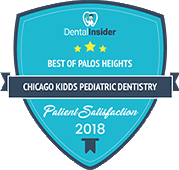
Fluoride is a naturally occurring mineral found in the human body, soil, and certain foods including meat, eggs, and fish. In dentistry, this mineral is used to strengthen teeth and prevent tooth decay. Professional treatments, fluoridated water, and fluoridated toothpastes can be helpful in supporting the dental health of both children and adults alike.
Professional Treatments
Our Chicago pediatric dentistry services include professional fluoride treatments. We recommend that our patients receive these treatments twice per year (typically at their regular checkups) as part of cavity prevention efforts. During a treatment, a highly concentrated solution will be applied to your child’s teeth and left to sit for several minutes. After the treatment is complete, we may ask that your child refrain from eating for a short period of time (30 minutes to an hour).
Fluoridated Toothpastes
Most toothpastes are fluoridated to help support the user’s dental health. The amounts contained in commercially available toothpastes are ideal for brushing, but are not meant to be swallowed. Because of this, it may not be advisable for very young children to learn how to brush their teeth with a fluoridated toothpaste. We recommend opting for a fluoride-free toothpaste until your child has practiced spitting out toothpaste while brushing their teeth.
Community Water Fluoridation
Many communities, including Chicago and Palos Heights, choose to add low levels of this important mineral to the public water supply as part of efforts to prevent tooth decay. Studies have shown that this cost-effective solution reduces cavities by about 25% in children and adults. In fact, the Centers for Disease Control and Prevention has recognized water fluoridation as one of the greatest public health achievements of the 20th century.
Who is Most at Risk of Cavities?
Though we recommend professional treatments as part of a regular prevention efforts, certain individuals may be especially at risk of developing cavities.
- Deep pits and fissures on the chewing surfaces of the teeth
- Low saliva flow due to medical conditions, treatments, or medications
- Frequent sugar and carbohydrate intake
- Exposed and sensitive root surfaces
- Recent history of tooth decay
- Poor oral hygiene
Visit Us for Chicago Pediatric Dentistry
While treatments alone—at home or in the dental office—will not prevent tooth decay, they can help support a child’s overall oral health. It’s important to continue brushing twice per day, flossing regularly, eating balanced meals, and visiting your Chicago pediatric dentist for regular checkups. Please contact us today to schedule an appointment for your child!












